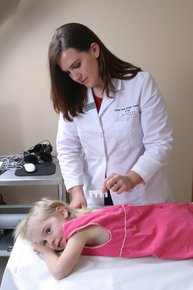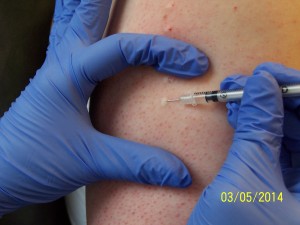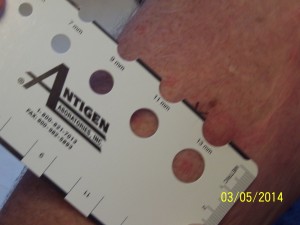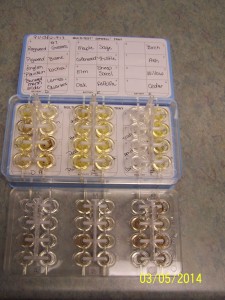By Dr. Todd
 Being allergic basically means that your immune system works too well. That is, you react to substances in the environment that don’t bother the rest of us. This hypersensitivity can begin at any time in our lives and often follows a heavy exposure to a specific allergen. The nose and upper respiratory system ends up being the target organ for allergies, which is why we owe it to our patients to care for all of their allergy needs.
Being allergic basically means that your immune system works too well. That is, you react to substances in the environment that don’t bother the rest of us. This hypersensitivity can begin at any time in our lives and often follows a heavy exposure to a specific allergen. The nose and upper respiratory system ends up being the target organ for allergies, which is why we owe it to our patients to care for all of their allergy needs.Based on a detailed history and thorough examination, we may advise skin or blood testing to determine what you are allergic to. Blood testing offers many patients a convenient allergy screening. We often find this extremely helpful for our allergic pediatric patients. The fact that we have them under a general anesthetic to perform various ENT surgeries give us a unique advantage. We can perform either blood or skin testing without traumatizing the patient. We are constantly reassessing the performance of different allergy labs and use only the best for our patients.
 Testing the patient directly, that is skin testing, offers the best results for most patients.
Testing the patient directly, that is skin testing, offers the best results for most patients.
We utilize a method of skin testing which combines efficiency with accuracy. First we carefully select allergens that cover what patient may be allergic to in this region. We also do an expanded panel of molds because these seems to affect more of our chronic sinus patients. We begin testing with what is often termed “prick” testing. This reliably picks up all severe allergies. Based on these results we then go farther to pick up more subtle allergies. We do this with what is called “intradermal” testing.
 What we do next is what sets us apart from other allergy practices. We don’t just stop and tell you what you are allergic to, we do further testing to quantify just how allergic you are to each allergen. This is done with 5 fold dilutions of the standardized allergen using intradermal techniques. The results are reproducible and allow us to essentially “handicap” your allergies. That is, if you are highly allergic to ragweed and only mildly allergic to dust mite we mix your immunotherapy accordingly. You are started on a higher concentration of dust mite and a lower concentration of ragweed. Using this “tailored” immunotherapy is superior in that it allows us to escalate the allergen doses in your shots more quickly. In addition to treating your allergies more effectively, it is also safer. Because the mixture in your shots matches your sensitivities you are less prone to reactions.
What we do next is what sets us apart from other allergy practices. We don’t just stop and tell you what you are allergic to, we do further testing to quantify just how allergic you are to each allergen. This is done with 5 fold dilutions of the standardized allergen using intradermal techniques. The results are reproducible and allow us to essentially “handicap” your allergies. That is, if you are highly allergic to ragweed and only mildly allergic to dust mite we mix your immunotherapy accordingly. You are started on a higher concentration of dust mite and a lower concentration of ragweed. Using this “tailored” immunotherapy is superior in that it allows us to escalate the allergen doses in your shots more quickly. In addition to treating your allergies more effectively, it is also safer. Because the mixture in your shots matches your sensitivities you are less prone to reactions.
 Although our methods are a bit more labor intensive and take extra time, we find them to be worthwhile to our patients success. We also make good use that time to counsel and educate our patients. Successful therapy of the sinus and allergy patient often requires a combination of environmental controls, immunotherapy, and even surgical intervention. When it comes to the nose we owe it to our patients to be expert in everything. Our unique combination of training and expertise allows us to be the final consult for any nasal, sinus, and allergy problems.
Although our methods are a bit more labor intensive and take extra time, we find them to be worthwhile to our patients success. We also make good use that time to counsel and educate our patients. Successful therapy of the sinus and allergy patient often requires a combination of environmental controls, immunotherapy, and even surgical intervention. When it comes to the nose we owe it to our patients to be expert in everything. Our unique combination of training and expertise allows us to be the final consult for any nasal, sinus, and allergy problems.